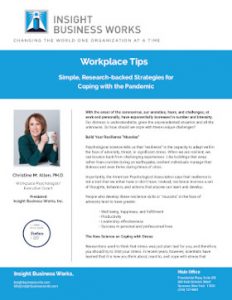Last updated on February 14th, 2023
With the onset of the coronavirus, our anxieties, fears, and challenges, at work and personally, have exponentially increased in number and intensity. Our distress is understandable, given the unprecedented situation and all the unknowns. So how should we cope with these unique challenges?
Build Your Resilience “Muscles”
Psychological science tells us that “resilience” is the capacity to adapt well in the face of adversity, threat, or significant stress. When we are resilient, we can bounce back from challenging experiences. Like buildings that sway rather than crumble during an earthquake, resilient individuals manage their distress and even thrive during times of crisis.
Importantly, the American Psychological Association says that resilience is not a trait that we either have or don’t have. Instead, resilience involves a set of thoughts, behaviors, and actions that anyone can learn and develop.
People who develop these resilience skills or “muscles” in the face of adversity tend to have greater:
- Well-being, happiness, and fulfillment
- Productivity
- Leadership effectiveness
- Success in personal and professional lives
We want to help you and your team through this unusual time.Download this special pdf version of this article to print or forward to your team. |
 |
The New Science on Coping with Stress
Researchers used to think that stress was just plain bad for you, and therefore, you should try to limit your stress. In recent years, however, scientists have learned that it is how you think about, react to, and cope with stress that determines whether it is harmful to you or not.
People who draw on their internal resources to cope with adversity and stress perform even better than people who had less stress! Think of it as if you were preparing for a competition such as a race. Your heart may be pounding as you approach the starting block, but your increased heart rate is evidence of your body preparing you for a challenge, not a sign that something is wrong. It is essential to understand that learning to build your resilience IS key to well-being, not avoiding the stress. This insight is particularly relevant during the coronavirus crisis. In engaging in teleworking and social distancing, we limit the spread of the coronavirus, but we can’t avoid the stress from it.
Five Simple Strategies
While there is not a one-size-fits-all approach to resilience building, psychological science does suggest some general strategies of high value. Some tools may come more easily for you than others and may become your favorite or go-to tools. Yet, it helps to have many tools in your tool basket to choose from. Practice with those that don’t come as naturally for you, and you will build your resilience skills.
1) Develop Your Emotional Agility Through Mindfulness
Being “mindful” means accepting that it is 100% normal to have feelings of worry and anxiety right now for reasons noted above. However, these feelings don’t have to “run the show” or become debilitating. Accepting these thoughts and feelings, viewing them like waves on the ocean can help us not to get stuck in them, where they have a more negative impact on us. Ocean waves are sometimes large and sometimes small. We can’t stop them, but we can’t hold onto them either. As Jon Kabat-Zinn famously said, “We can’t stop the waves, but we can learn to surf.”
We become more emotionally agile by practicing mindfulness, paying attention to the present moment, and staying in today rather than staying stuck in worrying, anger, or sadness.
2) Practice Healthier Coping Mechanisms for Managing Stress
While it is understandable that we will feel stressed and may have increased worry or sadness, it is vital to cope with these feelings using as healthy coping mechanisms as possible.
While this means that it’s okay to use some comfort strategies, such as our favorite foods, TV shows and movies, or a glass of wine, we need to make sure not to go overboard on things that can feel good, but that reduce our ability to feel good or to cope well. So be sure also to use healthier strategies, such as exercise, meditation (referred to above), getting outdoors safely, engaging in a hobby, or learning a new skill. We may want to limit “retail therapy,” watching the news 24/7, and overdoing the comfort food and drink.
3) Stay Connected with Others
As human beings, we are social animals. The ways we create safety and security is through our bonds with others. Connecting is more difficult given the social distancing we must all practice. So we must find ways to feel and stay connected with others—this may be the people you share the household with and also your co-workers in both formal and informal virtual settings. Some workplaces have left an online meeting room open for people to simply go in and chat informally with other people who drop in.
4) Find Meaning and Purpose
There is also much research that having clarity of purpose and a sense of our “why” is critical. When we choose our actions based on our values, we cope much better with hardship. Gratitude, kindness, and compassion play a role too. There is a vast amount of research demonstrating that some type of gratitude practice enhances well-being. The “pay-it-forward” aspect of kindness is real. So, find methods that work for you—some things you can do to appreciate the good things in your life and to give back to others in your way.
5) Develop Your “Growth” Mindset
Finally, when we have a mindset that sees each experience as an opportunity for learning, growth, and development, we have a greater sense of well-being and are more resilient. An important question is, what we can learn from our experience? In the current coronavirus crisis, what are our opportunities for learning and growth? Perhaps with less time to spend away from home, you might develop a new hobby or do a project that you have put off. What opportunities will you choose to take during this stressful time?
Resources
These are only a few of the evidence-based strategies for coping with adversity and the distress that are natural given the current crisis. We are in this together. We can learn from one another, so be sure to share your ideas for coping with others. Pay it forward!
Some resources you may want to check out in practicing the strategies described above include headspace.com, Calm.com, and OakMeditation.com. You can also go to UC Berkeley’s site called The Greater Good Science Center: Science-based Practices for a Meaningful Life and UCLA’s Mindful Awareness Research Center.
There is also some advice for managing work from home for Newly Remote Workers from organizational psychologists.
Summary
Learning how to manage stress during the coronavirus pandemic can be accomplished by building your resilience “muscle” through the following five strategies:
- Develop Your Emotional Agility Through Mindfulness
- Practice Healthier Coping Mechanisms for Managing Stress
- Stay Connected with Others
- Find Meaning and Purpose
- Develop Your “Growth” Mindset
Please reach out to me at chris@insightbusinessworks.com for assistance. If you have success stories or other approaches that have been helpful to you, please share them in the comments. Stay safe!







0 Comments